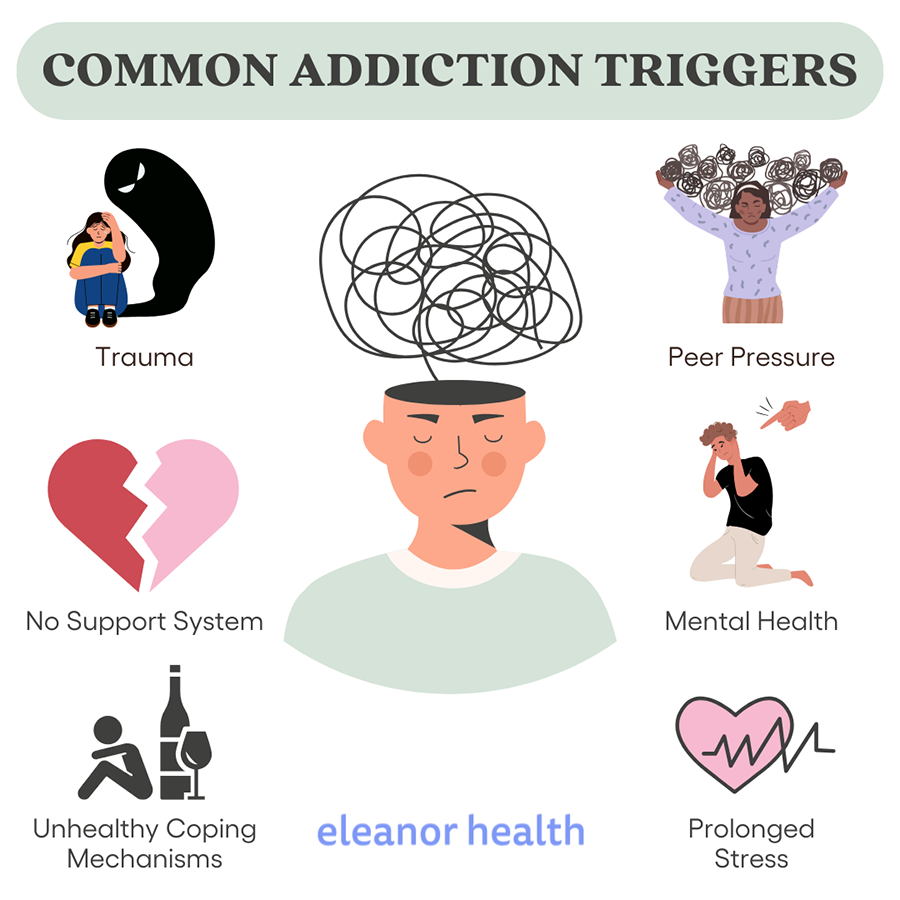Addiction is a complex issue that impacts individuals from all walks of life in ways that bring both shared and unique experiences and challenges for each individual. A person’s genetics, environment, and mental health can all play a role in developing, treating and managing substance use disorders. Addiction can impact a person’s entire life, and likewise, identifying its root cause may require exploring and understanding many aspects of that life. Understanding the root causes of addiction is crucial in finding the right support for those grappling with substance use disorders.
Substance use disorders, like alcoholism or drug addiction, are multifaceted conditions, and the root cause will vary from person to person. Addiction is an incredibly difficult illness characterized by compulsive substance use despite harmful consequences, and every person will have a unique journey to uncover the major contributing factors to their addiction challenges
Some examples of factors that contribute to substance use disorders include:
Sometimes, signs of addiction can offer a starting place to think about the root cause of a person’s substance use disorder, although having productive, healthy, and empathetic dialogue around signs and symptoms of substance use disorder can be highly challenging. For this reason, many people choose to follow a treatment program in order to explore and identify the root cause while also receiving treatment to feel, think, and operate better.

Substance use and addiction stem from various underlying causes. If you struggle with any of the following, it’s important to seek professional support as soon as possible.
Traumatic experiences, whether physical or emotional, can leave deep scars that individuals may attempt to numb or escape through substance use. Trauma can occur in various forms, such as childhood abuse, domestic violence, or witnessing traumatic events. When left unresolved, the emotional pain and distress associated with trauma can become a catalyst for addiction.
Individuals with mental health conditions, such as depression, anxiety, bipolar disorder, or personality disorders, are at an increased risk due to chemical imbalances in the brain that impact mood and behavior, including impulse control. Drugs or alcohol interact with many of the same neural networks, which for some, can create dangerous spirals, such as those seeking to self-medicate.
Some individuals may develop an addiction as a maladaptive coping mechanism in response to stressful or overwhelming situations. Individuals with a perceived (or real) lack of control, for instance, may turn to substances to ease the discomfort. If health coping skills, methods, and solutions continue to be absent, this pattern of unhealthy coping will ultimately lead to addiction, tolerance, and/or dependence.
Social influences, particularly during formative events and ages like adolescence and young adulthood, can play a significant role in the initiation of substance use. For instance, the desire for acceptance and to avoid feelings of loneliness can cause individuals to experiment with drugs or alcohol, potentially setting the stage for future addictive behaviors.
A lack of a strong support system, whether family or friends, can contribute to the development of addiction. Without a network of positive relationships and resources, individuals may feel isolated and turn to substances as a means of coping or filling an emotional void. A lack of support system can also increase the risk of mental health issues which is a major cause of addiction.
Stress, whether due to work, relationships, finances, or other life circumstances, can take a toll on an individual’s well-being. When stress becomes overwhelming and persistent, some individuals may turn to drugs or alcohol as a way to manage or cope with anxiety. Unfortunately, as the frequency of substance use increases, it is much more likely to lead to an addiction, particularly if the underlying stressors and anxiety are left untreated.
When the underlying causes of addiction, such as mental health disorders, trauma, or lack of a support system, are not addressed during recovery, the likelihood of relapse significantly increases. Treatment that focuses solely on eliminating the substance use without addressing these deeper issues, can maintain the same level of emotional pain, anxiety, or depression that initially drove the addiction.
This unresolved distress can make it difficult for a person to sustain sobriety, as they remain vulnerable to using substances as a way to self-medicate. Comprehensive treatment plans that incorporate therapy, medication, and lifestyle changes can effectively address both the addiction and its psychological causes are essential for lasting recovery.
At Eleanor Health, we understand the complexities of addiction and the importance of addressing its underlying causes. Our holistic approach to addiction treatment involves in-person and online Medication-Assisted Treatment (MAT), which is a combination of FDA-approved addiction medications and evidence-based therapies.
MAT has proven effective in reducing cravings and managing withdrawal symptoms, which are particularly beneficial during early sobriety. By addressing both the physical and psychological aspects of addiction, we empower individuals to overcome their substance use disorders and reclaim their lives.
Our compassionate and supportive team of healthcare professionals is dedicated to providing personalized interventions for each individual’s unique needs and circumstances. We prioritize a non-judgmental and empathetic approach, creating a safe and inclusive environment for individuals to embark on their recovery journey.
If you or a loved one is struggling with addiction, know that you are not alone. Eleanor Health is here to support you every step of the way. Contact us today to learn more about our virtual MAT services and take the first step towards a life of recovery.
 How Prescription Medications Can Affect Addiction Recovery
How Prescription Medications Can Affect Addiction Recovery
 How to Stop Drinking Alcohol Safely: The Journey Towards Recovery
How to Stop Drinking Alcohol Safely: The Journey Towards Recovery
 Benefits of Online Addiction Treatment
Benefits of Online Addiction Treatment